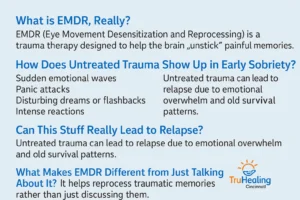When you’re newly sober, the hardest part often isn’t saying no to the substance—it’s sitting with everything that comes roaring in when the noise fades.
Grief you didn’t expect. Loneliness that wraps around your spine. Flashes of things you haven’t thought about in years—or maybe have been trying not to.
If you’ve started to wonder whether the past is trying to pull your recovery backward… it probably is. And if the word “trauma” feels too heavy or too clinical, that’s okay. You don’t have to call it anything to know it hurts.
What matters is that you’re here. Still trying. Still sober. And that means we can talk about real healing—not just white-knuckling survival.
Here are the questions I hear most from people in early recovery who are beginning to wonder about trauma—and whether therapy like EMDR could actually help them feel whole again.
What is EMDR, really?
EMDR (Eye Movement Desensitization and Reprocessing) is a trauma therapy designed to help the brain “unstick” painful memories, sensations, or beliefs that didn’t get properly processed when they happened.
Here’s the simplest way to think of it:
When something traumatic happens—whether it’s a major event or a subtle, ongoing pain—your brain sometimes stores it like a live wire instead of a closed file. That “wire” keeps sending signals: anxiety, fear, shame, disconnection. EMDR helps your brain safely revisit the memory and finish processing it, using bilateral stimulation (like guided eye movements or tapping) to do so.
It’s not talk therapy in the traditional sense. You don’t have to explain everything in detail. You don’t have to relive it over and over.
You just have to show up with the parts of your story that still feel charged—and let your nervous system finish what it didn’t get to complete back then.

How does untreated trauma show up in early sobriety?
Trauma has a way of being quiet until you’re not using anymore.
In early recovery, people often report:
- Sudden emotional waves without clear cause
- Panic attacks or physical anxiety
- Disturbing dreams or flashbacks
- Shame that doesn’t match current behavior
- Emotional numbness or “flatness”
- Intense reactions to seemingly small things
- Feeling disconnected from their own body or memory
And then comes the spiral: Why do I still feel this way? I thought getting clean would fix it.
You’re not crazy. This is what happens when we take away the thing we were using to keep trauma quiet.
Can this stuff really lead to relapse?
Yes. And it’s not because you don’t want recovery enough.
Untreated trauma can lead to relapse in two major ways:
- Emotional Overwhelm – The intensity of unprocessed emotions can feel unbearable. Using becomes a way to escape, not just to feel good.
- Old Survival Patterns – Many people used substances to cope with trauma long before they even identified it as trauma. When the pain resurfaces, the brain wants what worked before.
Addiction isn’t just about substance—it’s about what that substance used to do for you. If trauma never got safely addressed, your brain may try to bring back the only coping method it knows.
What makes EMDR different from just talking about it?
Traditional talk therapy can be incredibly helpful—but sometimes, words can only go so far.
Here’s where EMDR is unique:
- It helps process rather than just discuss
- It reduces the emotional charge without rehashing every detail
- It works with body sensations and emotional memory—not just logical thought
- It allows healing without needing to “understand” everything first
Think of EMDR like emotional physical therapy. You’re not just thinking about the injury—you’re retraining your nervous system to move again without flinching.
I don’t remember all the trauma. Can I still do EMDR?
Yes. You do not need a perfect timeline or full memory to benefit.
Many people in early recovery can’t name what exactly went wrong—just that something never felt right. Maybe it’s a feeling of being unsafe. Maybe it’s a vague memory of being shamed, neglected, or violated. Maybe it’s a body memory—tight chest, stomach knots, or freezing up in situations that feel too familiar.
EMDR works with what is present now—thoughts, images, emotions, or physical sensations. That’s enough to begin.
Pain doesn’t need to be “validated” by clarity to be worth healing.
What if I’m too emotionally fragile to handle EMDR right now?
Then we don’t start with trauma. We start with safety.
At TruHealing Cincinnati, we only begin trauma processing when your nervous system has the tools it needs to stay grounded. For some, that takes a few sessions. For others, a few months.
You are never rushed. We meet you where you are.
In communities like Springfield, Ohio, where people often go years without emotional support, many clients worry that opening up will flood them. But with the right support, opening up can feel like relief, not drowning.
How long does EMDR take to “work”?
It depends.
Some clients feel major relief after just a few sessions on a single memory. Others use EMDR for multiple themes or long-standing trauma and continue for months.
The goal isn’t to “erase” your past. It’s to make it livable. To reduce the emotional intensity. To stop the same survival loop from hijacking your present.
You’ll know it’s working when you can remember the pain—but it no longer controls your body or choices.
Can EMDR help with loneliness in recovery?
Yes—but maybe not in the way you expect.
EMDR won’t magically make you feel surrounded by friends. But it can help untangle the shame that keeps you from reaching out. It can ease the fear of being seen, of not being “good enough,” of trusting again.
Many people in recovery isolate not because they want to—but because connection feels unsafe or undeserved.
By softening the internal story, EMDR can make connection possible. And that’s often the first step to not feeling so alone anymore.
I’m in Indianapolis. Can I still access EMDR therapy?
Yes. TruHealing Cincinnati serves clients from across the region, including Indianapolis, Indiana, and we can help you explore treatment options that include EMDR therapy as part of trauma-informed addiction care.
Whether you’re close enough for in-person support or need help finding services near you, we’ll meet you where you are.
What if I’m still not sure I’m “ready” for trauma therapy?
Then take your time.
Just reading this blog is a step. Asking the question is a step. You don’t have to commit to EMDR right now. You don’t even have to be sure trauma is “your issue.”
You just have to stay curious about what might still be hurting. And when you’re ready, we’ll be here to help you hold it gently—and eventually, lay it down.
Ready to stop carrying it all alone?
Call (888) 643-9118 to learn more about our EMDR therapy and trauma treatment options in Cincinnati, Ohio.
Whether you’re from Springfield, Indianapolis, or just quietly figuring this out for yourself—your pain deserves care, not silence.


